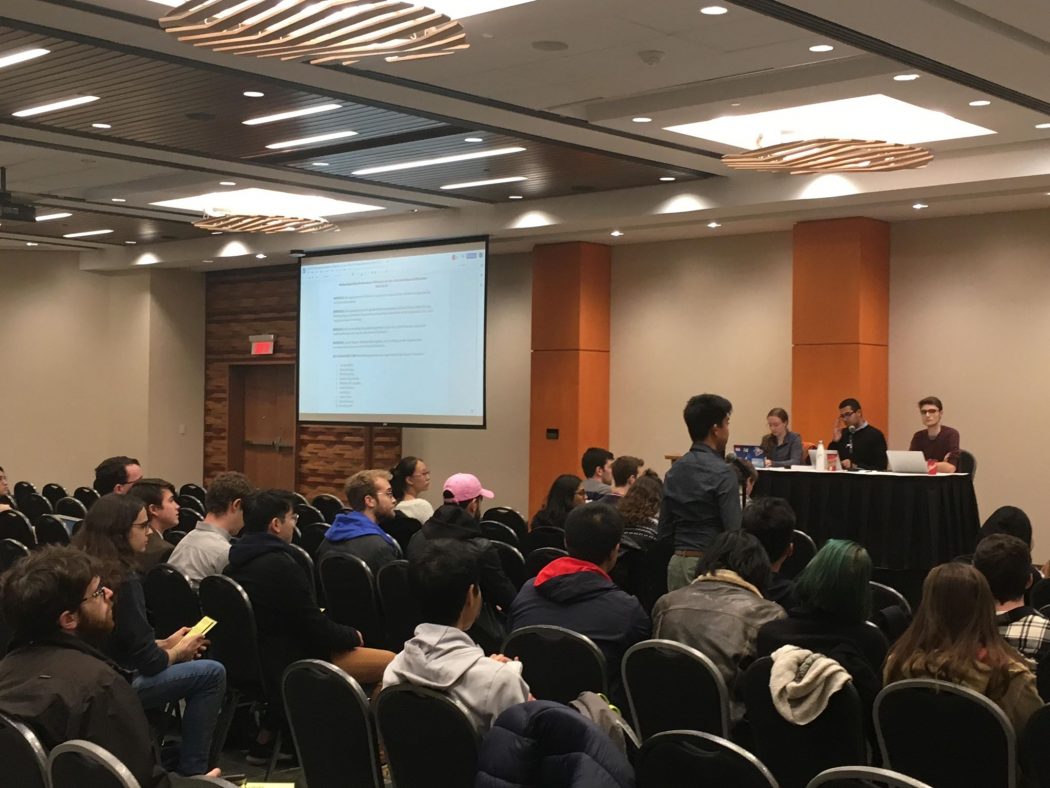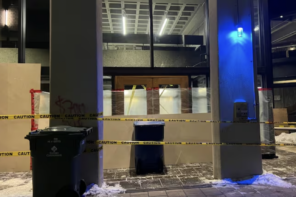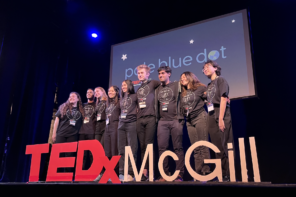The Fall 2018 General Assembly (GA) took place on October 29 in the basement of New Residence. Attendance fell far short of the 350 people required to meet quorum, with around 50 in attendance. Because of this, all approved motions were deferred to the upcoming Legislative Council meeting on November 1.
The General Assembly began with the quick approval of routine motions, including the minutes from the Fall 2017 and Winter 2018 GAs, the Motion Regarding Nomination of Directors, which nominates members at large to the SSMU Board of Directors, and the Motion Regarding the Nomination of an Auditor. The speedy approval of all items on the agenda left much time for Executive Reports.
Report by the VP Internal Affairs:
The first report was presented by the VP Internal Affairs, Matthew McLaughlin. He went over the specifics of this year’s Halloween event, Children of the Corn, which had record turnout compared to years prior. The event takes place annually but is usually held in the William Shatner building, though this year it was moved to Macdonald Campus due to construction downtown.
McLaughlin outlined a problem with transportation services on the night of the event, which he elaborated on during Question Period. He explained that due to the drunken conduct of some students (which included vomiting), some of the chartered buses refused to fulfill the return trip, leaving many students without a way to get back downtown. After several attempts at problem-solving, the only viable option was encouraging students to use the Uber app to get home. McLaughlin said that SSMU will reimburse every student for the costs, estimating that it will reach $10 000, “but it could go higher than that.” McLaughlin said that SSMU prioritized “safety over costs,” and that he “did what [he] had to do to get all students home safely that night.”
Keating Reid, Editor at the McGill Tribune, asked the VP Internal where the money to pay for this will come from. McLaughlin replied, “the way things work is we do have a lot of rainy day money, in the sense that we have funds that can potentially be accessed to cover this. But we’re still exploring… From what I can tell it’s not going to be a major problem. Again my priority was to make sure everyone got home safe, and again costs come after safety.”
McLaughlin went on to detail that a committee he heads, Student’s Society Programming Network, wants to create more opportunities for dry events, and further their communication with the environment and equity committees. He created a “sustainability quarter” in ListerVs, partnered with popular McGill meme accounts, and is trying to take a more personalized approach to social media and showcase “the faces behind SSMU”.
He is following through on some of his campaign promises, including spearheading the creation of a Centralized Calendar to be launched next semester which will be a one-stop-shop for students to check upcoming events.
Report by the VP Finance
Jun Wang, the VP Finance, was next to present his report, which centred primarily on the SSMU club bank transition from Scotiabank to RBC. He stated that the move, which has disrupted the operations of many campus clubs and organizations, was prompted by a need to consolidate and centralize SSMU’s financial operations.
According to Wang, the shift to RBC Express will centralize club finances, and create a way for SSMU to monitor how clubs spend their money. The new system allows for the viewing of banking transactions online, holding credit cards, ACH transfers, and other new features. Wang stated that he will be elaborating on this at club workshops which will be held on November 1, 2, 5, and 6 to teach them how the new banking system will operate.
The VP Finance highlighted other accomplishments, including: the creation of an Accounting Guide for Clubs, streamlining the process for funding requests, and reducing expenses to be in line with the budget.
Wang also emphasized that his goal for the year is to promote the long-term financial sustainability of SSMU and ensure that each department complies with their budgets. He reiterated his dedication to fixing SSMU’s finances.
During question period, Wang was asked by U1 Arts student, Ruofan Wang, if the additional $10,000 expense for Halloween transportation would affect SSMU financial activities going forward. Wang stated that there would be no budget cuts to compensate for the expenses, and that “right now it’s just a negative department.” Wang proposed potentially looking into the SSMU investment fund to see if there are any investments to be liquidated.
Naomi Shi, a U0 Arts student, asked Wang how the bank transition would improve the lack of oversight on club finances. Wang stated, “with the new banking process, we sort of eliminate the bank from the equation, so instead of dealing with SSMU, the club, and the bank, it will essentially be dealing with SSMU instead. With the new banking system, [SSMU] essentially becomes the administrator of the account… not only is this also very transparent for clubs, it’s also a great tool for the accounting department to make sure everything is compliant.”
Report by VP Student Life
VP Student Life, Sophia Estrele, detailed the events and planning that led up to SSMU activities night, which was made more accessible this year by adding a numbered directory for tables. As well, websites were hyperlinked to the directory to make the event accessible to people who couldn’t show up, namely Jewish students who could not show up on the Friday.
Estrele has been helping student groups book spaces in New Rez, Carrefour Sherbrooke, and more buildings to make up for the unavailability of the downtown SSMU building. She highlighted her upcoming mental health collaboration with Rez Life, Drawn ‘n’ Discuss, as well as the first annual Mental Health Week which was held in October and included two panel discussions: one on disordered eating, and another on depression and anxiety.
Estrele promoted a mandatory Indigenous Alliance Solidarity policy for clubs, requiring traditional territorial land acknowledgements at all their events. She ended her presentation with a list of goals to upkeep for the rest of her term, including: trying to get more professors involved in student groups, increased advocacy around mental illness and the harmful language people use, and to create a more user-friendly interface to get in touch with clubs.
Nellia Halimi, U3 Arts student asked about potentially making mental health services more accessible, and Estrele replied: “I brought these [concerns] up to Counselling Services, but unfortunately they didn’t take them really seriously or give viable solutions for it. I’ve been trying to think of ways to improve it, or at least try and work with McGill to fix that, but it is out of [my] control, all I can do is reinforce the fact that this is important for students. I want to make it clear that those are strong concerns.”
Report by the SSMU President:
President Tre Mansdoerfer’s report emphasized efforts by SSMU to capitalize on inter-university relationships and knowledge. Through conversations with other universities across Canada and the US, SSMU has created new initiatives and policies designed to incorporate other schools’ best practices. For example, students in gender transitions can now change their McGill Student ID card for free to reflect their true gender, a practice which was previously implemented but will now be widely stated.
Mansdoerfer said that he has been working on improving inter-faculty relationships, primarily by building connections through more informal and one on one meetings. He acknowledged that the SSMU building closure has been a major challenge, but stated that he believed SSMU has done a good job in adapting and responding to the situation. He highlighted the recent lease signing for 680 Sherbrooke, which will help to open up more space to help other groups. He also pointed to the recent purchase of 3501 Peel and stated that surveys will be released to consult students on what the space should be used for.
The President briefly mentioned the potential implementation of a blacklisting policy, which would be a way for faculties to communicate with one another about individuals who have been restricted from their events.
When asked about SSMU’s policy towards the provincially-planned increase on international tuition, Mansdoerfer deferred his answer to VP University Affairs, Jacob Shapiro, who responded, “the university is committed to only be raising [tuition fees] as of next year incrementally [and] not be raising anything for anyone this year. This becomes a provincial representation question. It’s very hard to mobilize against a university over a political and provincial decision made. This is something we can do in tandem with other universities, but in the interim, we’ll be working more with the university to keep those promises of not raising anything for anybody who’s here.”
Report by VP University Affairs
Jacob Shapiro, VP University Affairs, was the last to present. He highlighted his successful initiative to hire associate senator positions and referred to the Senate’s Approval of the Motion Regarding Divestment from Fossil Fuels as “a win” for the McGill community. He outlined that he continues to engage with and advocate for a Fall Reading Week, mobile sexually transmitted infections clinics, and more, all of which are the initiatives of student senators.
He encouraged SSMU members to read the report by the Task Force on Respect and Inclusion, and emphasized some key takeaways, including the need for a Muslim prayer space, issues related to on-boarding new students, and more.
When asked about the closure of Shulich Library, Shapiro responded that though neither he nor the President know the timeline, “I believe there’s going to be serious renovations on it, beyond that I’m not entirely sure.” Mansdoerfer jumped in, commenting: “my understanding is it will close, I don’t think it’s this year or this semester, but I don’t even feel comfortable saying that. It will be closing for renovations at some point.”








